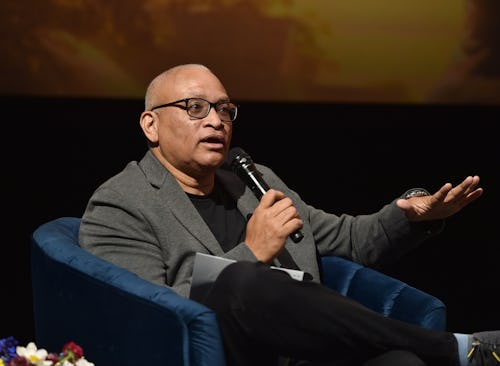
Few have had as illustrious of a career in comedy or television as Larry Wilmore, and just as few have experienced the merciless ins and outs of the entertainment industry. The actor, writer, show creator (The PJs, The Bernie Mac Show), and all-around comedic entertainer, went deep in a thoughtful interview with Vulture, offering a fascinating window into the cutthroat, and often racist, ways the industry operates — and also the ways it’s changed.
His career in television, for instance, was first truly established during his time as a writer on the seminal sketch comedy show In Living Color, where he was given an introduction to the industry that would ultimately deviate from the norm: “There were no cultural fences in terms of, ‘Well, you can’t write about that because you’re white,’” Wilmore said. “Nope. All was fair game. It was really you got to bring the funny. It didn’t matter who you were. Keenen [Ivory Wayans, the creator and showrunner] was extremely democratic in terms of that.”
He added, “I mean, sure, there’s a nuanced conversation to be had about who should be telling stories, which is a different thing. But keep in mind Keenen was the head of that show….That was very powerful to me at that time — that Keenen did the show he wanted to do, and when he couldn’t do it, he left.”
It was a dilemma that Wilmore himself eventually struggled with multiple times, both on The Bernie Mac Show and on his late-night satirical news talk show The Nightly Show. On the former, the execs at FOX were attempting to oust him from the start, according to Wilmore’s “mole” from within the company. After he won an Emmy in 2002 (becoming the first Black TV writer to win in the comedy category), he recalled: “In the bathroom one day, the head of Fox at the time, Sandy Grushow, told my mole, ‘Well, I guess we can’t fire him now.’ That was his comment. Not, ‘Oh, we’re really proud of Larry.’”
He battled with the television heads the entire way through before he was eventually fired, despite the acclaim and success of his show. “Who gets the benefit of the doubt at that time? Not Black writers,” Wilmore said. “They considered me incompetent, like I didn’t know what I was doing. Meanwhile, I won an Emmy, two TCA Awards, Humanitas, a Peabody Award, Golden Globe nominee, Image Award. Every award you could possibly name meant nothing.”
Meanwhile, Wilmore’s show was one of the only places where Black writers had a place to work: “Here’s how it was expressed: Black writers were not on white shows. The only one from those days was Saladin Patterson, who got a job on Frasier. That was huge at the time. Never happened. When I would be at those Television Critics Association things when I was doing Bernie Mac, people kept asking, ‘Larry, how many Black writers on your show?’ I said, ‘Motherfucker, ask the white shows how many Black writers they have! I’m the one with Black writers. Who the fuck are you asking?’ I would get upset about it. Like, ask Friends, Frasier, all those shows. I’ve got more with just me than all those shows combined. And they would shut up at that.”
Eventually, when Wilmore hosted his late-night talk show The Nightly Show, he described its short-lived stint in similarly revealing terms:
Do you feel like Trevor Noah’s iteration of The Daily Show was the network’s attempt to find a middle point between your show and Jon’s show?
Tell me what you really think, Zak.
I’m interested in what you think.
What are you trying to say exactly? Are you saying they didn’t want two Black hosts? Are you saying they didn’t want Black to Black? Is that what you’re saying?
I’m not saying that; I’m asking.
Oh, I don’t know. I mean, I think you should call them and ask them. I think it’s a very good question. Although I would like to be on the record saying I have never even considered that, and I just want to thank you for bringing that point up.
Oh, and Wilmore also subtly and diplomatically exposed the issue with the transphobic fixation at the center of Dave Chappelle’s material in recent years. “Chappelle is interesting. I don’t know what the right term is, but I think he’s revealing himself onstage. He’s granted himself a certain permission, and he’s speaking to the audience in a way that nobody else quite does. That’s a touchy subject, though,” Wilmore said. “You’re not going to see me doing jokes in that area. My biggest reason is that any time there’s a group really feeling attacked, you’ve got to be careful. I would really have to have a good take on something to put myself out there with jokes.” Thankfully, Wilmore knows what he’s taking about — both in laughs and in terms of Black creativity.







